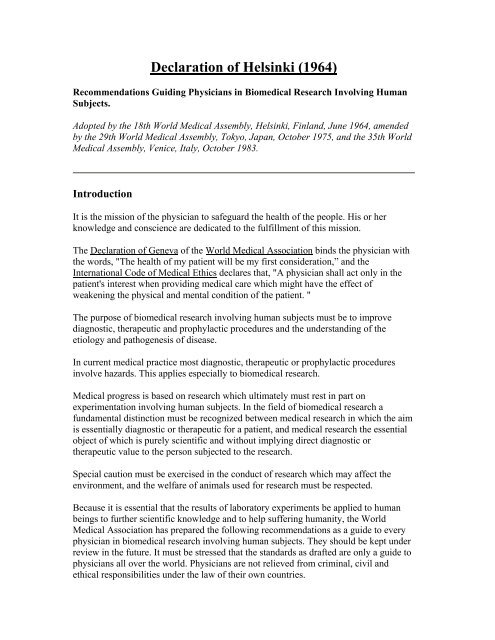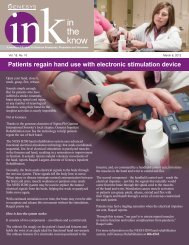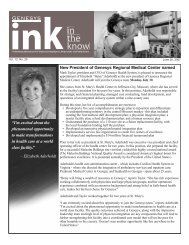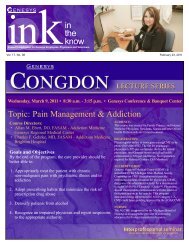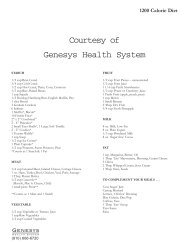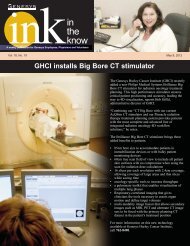Declaration of Helsinki (1964)
Declaration of Helsinki (1964)
Declaration of Helsinki (1964)
Create successful ePaper yourself
Turn your PDF publications into a flip-book with our unique Google optimized e-Paper software.
<strong>Declaration</strong> <strong>of</strong> <strong>Helsinki</strong> (<strong>1964</strong>)<br />
Recommendations Guiding Physicians in Biomedical Research Involving Human<br />
Subjects.<br />
Adopted by the 18th World Medical Assembly, <strong>Helsinki</strong>, Finland, June <strong>1964</strong>, amended<br />
by the 29th World Medical Assembly, Tokyo, Japan, October 1975, and the 35th World<br />
Medical Assembly, Venice, Italy, October 1983.<br />
Introduction<br />
It is the mission <strong>of</strong> the physician to safeguard the health <strong>of</strong> the people. His or her<br />
knowledge and conscience are dedicated to the fulfillment <strong>of</strong> this mission.<br />
The <strong>Declaration</strong> <strong>of</strong> Geneva <strong>of</strong> the World Medical Association binds the physician with<br />
the words, "The health <strong>of</strong> my patient will be my first consideration,” and the<br />
International Code <strong>of</strong> Medical Ethics declares that, "A physician shall act only in the<br />
patient's interest when providing medical care which might have the effect <strong>of</strong><br />
weakening the physical and mental condition <strong>of</strong> the patient. "<br />
The purpose <strong>of</strong> biomedical research involving human subjects must be to improve<br />
diagnostic, therapeutic and prophylactic procedures and the understanding <strong>of</strong> the<br />
etiology and pathogenesis <strong>of</strong> disease.<br />
In current medical practice most diagnostic, therapeutic or prophylactic procedures<br />
involve hazards. This applies especially to biomedical research.<br />
Medical progress is based on research which ultimately must rest in part on<br />
experimentation involving human subjects. In the field <strong>of</strong> biomedical research a<br />
fundamental distinction must be recognized between medical research in which the aim<br />
is essentially diagnostic or therapeutic for a patient, and medical research the essential<br />
object <strong>of</strong> which is purely scientific and without implying direct diagnostic or<br />
therapeutic value to the person subjected to the research.<br />
Special caution must be exercised in the conduct <strong>of</strong> research which may affect the<br />
environment, and the welfare <strong>of</strong> animals used for research must be respected.<br />
Because it is essential that the results <strong>of</strong> laboratory experiments be applied to human<br />
beings to further scientific knowledge and to help suffering humanity, the World<br />
Medical Association has prepared the following recommendations as a guide to every<br />
physician in biomedical research involving human subjects. They should be kept under<br />
review in the future. It must be stressed that the standards as drafted are only a guide to<br />
physicians all over the world. Physicians are not relieved from criminal, civil and<br />
ethical responsibilities under the law <strong>of</strong> their own countries.
I. Basic Principles<br />
1. Biomedical research involving human subjects must conform to generally<br />
accepted scientific principles and should be based on adequately performed<br />
laboratory and animal experimentation and on a thorough knowledge <strong>of</strong> the<br />
scientific literature.<br />
2. The design and performance <strong>of</strong> each experimental procedure involving human<br />
subjects should be clearly formulated in an experimental protocol which should<br />
be transmitted to a specially appointed independent committee for<br />
consideration, comment and guidance.<br />
3. Biomedical research involving human subjects should be conducted only by<br />
scientifically qualified persons and under the supervision <strong>of</strong> a clinically<br />
competent medical person. The responsibility for the human subject must<br />
always rest with a medically qualified person and never rest on the subject <strong>of</strong><br />
the research, even though the subject has given his or her consent.<br />
4. Biomedical research involving human subjects cannot legitimately be carried<br />
out unless the importance <strong>of</strong> the objective is in proportion to the inherent risk to<br />
the subject.<br />
5. Every biomedical research project involving human subjects should be preceded<br />
by careful assessment <strong>of</strong> predictable risks in comparison with foreseeable<br />
benefits to the subject or to others. Concern for the interests <strong>of</strong> the subject must<br />
always prevail over the interests <strong>of</strong> science and society.<br />
6. The right <strong>of</strong> the research subject to safeguard his or her integrity must always be<br />
respected. Every precaution should be taken to respect the privacy <strong>of</strong> the subject<br />
and to minimize the impact <strong>of</strong> the study on the subject's physical and mental<br />
integrity and on the personality <strong>of</strong> the subject.<br />
7. Physicians should abstain from engaging in research projects involving human<br />
subjects unless they are satisfied that the hazards involved are believed to be<br />
predictable. Physicians should cease any investigation if the hazards are found<br />
to outweigh the potential benefits.<br />
8. In publication <strong>of</strong> the results <strong>of</strong> his or her research, the physician is obliged to<br />
preserve the accuracy <strong>of</strong> the results. Reports <strong>of</strong> experimentation not in<br />
accordance with the principles laid down in this <strong>Declaration</strong> should not be<br />
accepted for publication.<br />
9. In any research on human beings, each potential subject mustbe adequately<br />
informed <strong>of</strong> the aims, methods, anticipated benefits and potential hazards <strong>of</strong> the<br />
study and the discomfort it may entail. He or she should be informed that he or<br />
she is at liberty to abstain from participation in the study and that he or she is
free to withdraw visor her consent to participation at any time. The physician<br />
should then obtain the subject's freely given informed consent, preferably<br />
inheriting.<br />
10. When obtaining informed consent for the research project the physician should<br />
be particularly cautious if the subject is in dependent relationship to him or her<br />
or may consent under duress. In that case the informed consent should be<br />
obtained by a physician who isn't engaged in the investigation and who is<br />
completely independent <strong>of</strong> this <strong>of</strong>ficial relationship.<br />
11. In case <strong>of</strong> legal incompetence, informed consent should be obtained from the<br />
legal guardian in accordance with national legislation. Where physical or mental<br />
incapacity makes it impossible to obtain informed consent, or when the subject<br />
is a minor, permission from the responsible relative replaces that <strong>of</strong> the subject<br />
in accordance with national legislation. Whenever the minor child is in fact able<br />
to give consent, the minor's consent must be obtained in addition to the consent<br />
<strong>of</strong> the minor's legal guardian.<br />
12. The research protocol should always contain a statement <strong>of</strong> the ethical<br />
considerations involved and should indicate that the principles enunciated in the<br />
present declaration are complied with.<br />
II. Medical Research Combined with Pr<strong>of</strong>essional Care<br />
(Clinical Research)<br />
1. In the treatment <strong>of</strong> the sick person, the physician must be free to use a new<br />
diagnostic and therapeutic measure, if in his or her judgment it <strong>of</strong>fers hope <strong>of</strong><br />
saving life, re-establishing health or alleviating suffering.<br />
2. The potential benefits, hazards and discomfort <strong>of</strong> a new method should be<br />
weighed against the advantages <strong>of</strong> the best current diagnostic and therapeutic<br />
methods.<br />
3. In any medical study, every patient- including those <strong>of</strong> a control group, if anyshould<br />
be assured <strong>of</strong> the best proven diagnostic and therapeutic method.<br />
4. The refusal <strong>of</strong> the patient to participate in a study must never interfere with the<br />
physician-patient relationship.<br />
5. If the physician considers it essential not to obtain informed consent, the<br />
specific reasons for this proposal should be stated in the experimental protocol<br />
for transmission to the independent committee (1, 2).
6. The physician can combine medical research with pr<strong>of</strong>essional care, the<br />
objective being the acquisition <strong>of</strong> new medical knowledge, only to the extent<br />
that medical research is justified by its potential diagnostic or therapeutic value<br />
for the patient.<br />
III. Non-Therapeutic Biomedical Research Involving Human Subjects<br />
(Non-Clinical Biomedical Research)<br />
1. In the purely scientific application <strong>of</strong> medical research carried out on a human<br />
being, it is the duty <strong>of</strong> the physician to remain the protector <strong>of</strong> the life and health<br />
<strong>of</strong> that person on whom biomedical research is being carried out.<br />
2. The subjects should be volunteers- either healthy persons or patients for whom<br />
the experimental design is not related to the patient's illness.<br />
3. The investigator or the investigating team should discontinue the research if in<br />
his/her or their judgment it may, if continued, be harmful to the individual.<br />
4. In research on man, the interest <strong>of</strong> science and society should never take<br />
precedence over considerations related to the well-being <strong>of</strong> the subject.<br />
http://www.cirp.org/library/ethics/helsinki/


